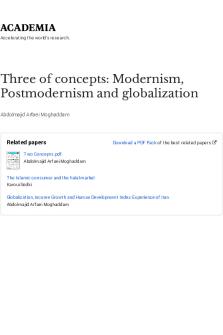Nissim Ezekiel and Indian Modernism DOC

| Title | Nissim Ezekiel and Indian Modernism |
|---|---|
| Author | John Thieme |
| Pages | 6 |
| File Size | 48 KB |
| File Type | DOC |
| Total Downloads | 60 |
| Total Views | 102 |
Summary
1 Nissim Ezekiel and Indian Modernism John Thieme In the first part of Salman Rushdie’s Midnight’s Children, ‘a rhymeless verbless poet’1 called Nadir Khan is one of several potential fathers for the as-yet-unborn narrator/protagonist Saleem. Saleem sees himself as ‘handcuffed to history’ (MC 9), a ...
Description
1 Nissim Ezekiel and Indian Modernism John Thieme In the first part of Salman Rushdie's Midnight's Children, 'a rhymeless verbless poet'1 called Nadir Khan is one of several potential fathers for the as-yet-unborn narrator/protagonist Saleem. Saleem sees himself as 'handcuffed to history' (MC 9), a personification of independent India, and he will be born at the exact moment of Independence. So the prospect that Nadir may turn out to be Saleem's father makes him a possible contributor to the DNA of the nation state that will come into being in 1947. But Nadir isn't Saleem's father and he is subsequently said to be a 'wrong turning' (MC 73) for Saleem's supposed mother, Amina. He is one of the many blind alleys into which Rushdie leads his readers as they try to discover the truth about Saleem's parentage. And, though Nadir first appears in the novel in 1942, the year the Congress Party adopted its 'Quit India' Resolution, he plays no part in the independence struggle. He is variously described as 'spineless' (MC 48) and a 'fat soft cowardly plumpie' (MC 51), and Rushdie is particularly scathing about his poetry, which is referred to as 'modernist' (MC 45). He is described as a 'bad poet, and as such a born survivor' (MC 49). Even his name, in one of the novel's many cross-cultural puns, suggests bathos. In short, given that he isn't Saleem's father – he hasn't even had sexual relations with Amina and there are doubts about his virility– the suggestion seems to be that Modernism is an impotent 'wrong turning' on the road towards a culturally independent India. In reality in the early 1940s, Modernism had yet to have much impact on Indian poetry, where the dominant voices were a lyrical Romanticism;2 and a tendency towards mysticism, of which Sri Aurobindo has been considered to be the most influential exponent. Modernism was, however, to play an important part in the years just after Independence and the poet generally seen as the most important moving spirit in its introduction into Anglophone Indian poetry was Nissim Ezekiel. In 1942, Ezekiel was a young man of seventeen, studying for his Inter Arts degree in Bombay3 and first beginning to write poems. At this point in his life, he was, though, more interested in politics and, in his own words, he was 'attracted by some of the concepts of socialism, and also nationalism, and desired to participate in the struggle for freedom'.4 Nevertheless, as a member of India's Bene Israel community, he was sceptical about the strategy of 'Gandhi, Nehru and Congress nationalism'.5 Unsurprisingly, his Jewish background made him feel that support for the anti- fascist struggle of World War II was a more important imperative than the campaign to end...
Similar Free PDFs

Modernism
- 2 Pages

Modernism and Gender
- 1 Pages

European Modernism
- 46 Pages

Ezekiel, the Bee Guardian
- 1 Pages

Notes ON Modernism
- 3 Pages

Summary - Peter Childs: Modernism
- 32 Pages

Post-Impressionism to Modernism
- 3 Pages

Modernism- Peter Childs
- 20 Pages
Popular Institutions
- Tinajero National High School - Annex
- Politeknik Caltex Riau
- Yokohama City University
- SGT University
- University of Al-Qadisiyah
- Divine Word College of Vigan
- Techniek College Rotterdam
- Universidade de Santiago
- Universiti Teknologi MARA Cawangan Johor Kampus Pasir Gudang
- Poltekkes Kemenkes Yogyakarta
- Baguio City National High School
- Colegio san marcos
- preparatoria uno
- Centro de Bachillerato Tecnológico Industrial y de Servicios No. 107
- Dalian Maritime University
- Quang Trung Secondary School
- Colegio Tecnológico en Informática
- Corporación Regional de Educación Superior
- Grupo CEDVA
- Dar Al Uloom University
- Centro de Estudios Preuniversitarios de la Universidad Nacional de Ingeniería
- 上智大学
- Aakash International School, Nuna Majara
- San Felipe Neri Catholic School
- Kang Chiao International School - New Taipei City
- Misamis Occidental National High School
- Institución Educativa Escuela Normal Juan Ladrilleros
- Kolehiyo ng Pantukan
- Batanes State College
- Instituto Continental
- Sekolah Menengah Kejuruan Kesehatan Kaltara (Tarakan)
- Colegio de La Inmaculada Concepcion - Cebu







